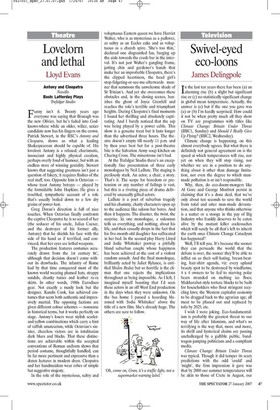Lovelorn and lethal
Lloyd Evans Antony and Cleopatra Novello Bash: Latterday Plays Trafalgar Studio Uunny isn't it. Twenty years ago everyone was saying that Branagh was the new Olivier, but he's faded into Godknows-where while an older, wilier, sexier candidate now has his fingers on the crown. Patrick Stewart, in the RSC's Antony and Cleopatra, shows us what a leading Shakespearean should be capable of. His lovelorn Antony is a relaxed, charismatic, insouciant and highly physical creation, perhaps overly fond of humour, but with an endless store of winning geniality. Stewart knows that suggesting greatness isn't just a question of fakery, it requires flashes of the real stuff, too. Opposite him is Octavian — whose trust Antony betrays — played by the formidable John Hopkins. He gives a troubled, sympathetic account of a role that's usually boiled down to a few dry grains of power-lust.
Greg Doran's direction is full of nice touches. When Octavian finally confronts the captive Cleopatra he is so scared of her (the seducer of his uncle, Julius Caesar, and the destroyer of his former ally, Antony) that he shields his face with the side of his hand as if terrified, and convinced, that her eyes are lethal weapons.
The production features costumes accurately drawn from the 1st century BC, although that decision doesn't come without its drawbacks. The infantry of Rome had by that time conquered most of the known world wearing plumed hats, strappy sandals, chunky tunics and leather ra-ra skirts. In other words, 1980s Eurodisco gear. Not exactly a manly look but the designer, Kandis Cook, has achieved costumes that seem both authentic and impressively martial. The opposing factions are given different colour schemes — nonsense in historical terms, but it works perfectly on stage. Antony's losers wear stylish scarletand-yellow combinations which carry a hint of raffish amateurism, while Octavian's sinister, cheerless victors are in totalitarian dark blues and blacks. That these distinctions are achievable within the accepted conventions of Roman uniform shows that period costume, thoughtfully handled, can be far more pertinent and expressive than a dozen lectures in modern dress. Cleopatra and her handmaidens wear robes of simple but suggestive majesty.
In the role of the mysterious, sultry and voluptuous Eastern queen we have Harriet Walter, who is as mysterious as a pullover, as sultry as an Eccles cake and as voluptuous as a church spire. 'She's too thin,' declared one disgruntled fan, barging up the aisle towards the crush-bar in the interval. It's not just Walter's gangling frame, jutting chin and gardener's hands that make her an improbable Cleopatra, there's the clipped heartiness, the head girl's stop-fidgeting-or-see-me-afterwards manner that summons the unwelcome shade of St Trinian's. And yet she overcomes these obstacles and, in the closing scenes, banishes the ghost of Joyce Grenfell and reaches the role's terrible and triumphant heights. During Cleopatra's final moments I found her thrilling and absolutely captivating. And I barely noticed that the asp was being played by a power cable. This show is a genuine treat but it lasts longer than the advertised three hours. The theatre doesn't empty till nearly 11 p.m. and by then your best bet for a post-theatre bite is the Salvation Army soup kitchen on Charing Cross. The minestrone isn't bad.
At the Trafalgar Studio there's an exceptionally fine presentation of three early monologues by Neil LaBute. The staging is perilously stark. An actor, a chair, a story. That's it. The scope for boredom or pretension or any number of failings is vast, but this is a riveting piece of drama delivered by unusually gifted actors.
LaBute is a poet of suburban tragedy and his chummy, chatty characters open up to the audience like saloon-bar bores. And then it happens. The disaster, the twist, the surprise. In one monologue, a salesman tells us everything, and nothing, about his life, and then casually drops in the fact that his five-month-old daughter has suffocated in her bed. In the second play Harry Lloyd and Jodie Whittaker portray a pitifully bland suburban couple whose happiness has been achieved at the cost of a violent random assault. And the final monologue, brilliantly acted by Juliet Rylance, is entitled Medea Redwc but so horrific is the climax that one rejects the implications throughout as being impossible. As I left, I imagined myself boasting that I'd seen these actors in an off-West End production in the days when they were unknown. On the bus home I passed a hoarding blazoned with 'Jodie Whittaker' above the title of a new film She's already huge. The others are sure to follow.














































 Previous page
Previous page